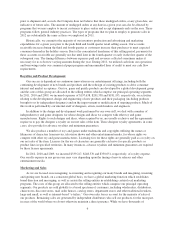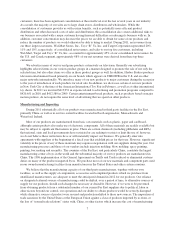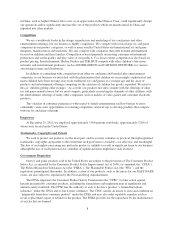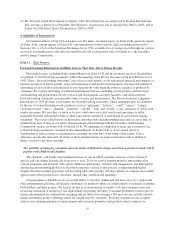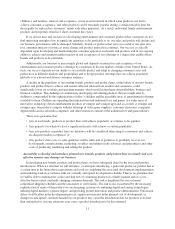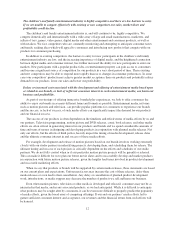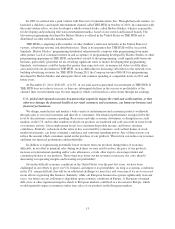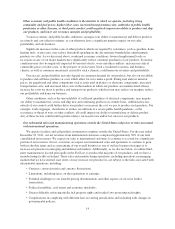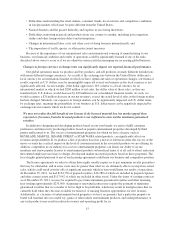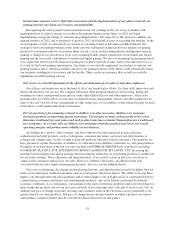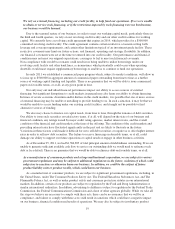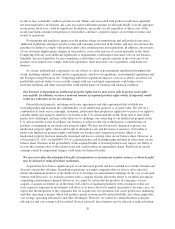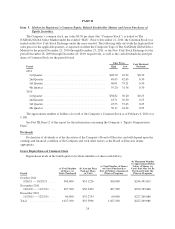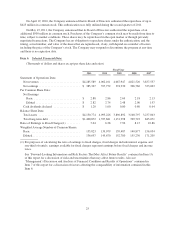Hasbro 2011 Annual Report Download - page 24
Download and view the complete annual report
Please find page 24 of the 2011 Hasbro annual report below. You can navigate through the pages in the report by either clicking on the pages listed below, or by using the keyword search tool below to find specific information within the annual report.• Difficulties understanding the retail climate, consumer trends, local customs and competitive conditions
in foreign markets which may be quite different from the United States;
• Natural disasters and the greater difficulty and expense in recovering therefrom;
• Difficulties in moving materials and products from one country to another, including port congestion,
strikes and other transportation delays and interruptions;
• Changes in international labor costs and other costs of doing business internationally; and
• The imposition of tariffs, quotas, or other protectionist measures.
Because of the importance of our international sales and international sourcing of manufacturing to our
business, our financial condition and results of operations could be significantly harmed if any of the risks
described above were to occur or if we are otherwise unsuccessful in managing our increasing global business.
Changes in foreign currency exchange rates can significantly impact our reported financial performance.
Our global operations mean we produce and buy products, and sell products, in many different jurisdictions
with many different foreign currencies. As a result, if the exchange rate between the United States dollar and a
local currency for an international market in which we have significant sales or operations changes, our financial
results, reported in U.S. dollars, may be meaningfully impacted even if our business in the local currency is not
significantly affected. As an example, if the dollar appreciates 10% relative to a local currency for an
international market in which we had $200 million of net sales, the dollar value of those sales, as they are
translated into U.S. dollars, would decrease by $20 million in our consolidated financial results. As such, we
would recognize a $20 million decrease in our net revenues, even if the actual level of sales in the foreign market
had not changed. Similarly, our expenses in foreign markets can be significantly impacted, in U.S. dollar terms,
by exchange rates, meaning the profitability of our business in U.S. dollar terms can be negatively impacted by
exchange rate movements which we do not control.
We may not realize the full benefit of our licenses if the licensed material has less market appeal than
expected or if revenue from the licensed products is not sufficient to earn out the minimum guaranteed
royalties.
In addition to designing and developing products based on our own brands, we seek to fulfill consumer
preferences and interests by producing products based on popular entertainment properties developed by third
parties and licensed to us. The success of entertainment properties for which we have a license, such as
BEYBLADE, MARVEL, SESAME STREET or STAR WARS related products, can significantly affect our
revenues and profitability. If we produce a line of products based on a movie or television series, the success of the
movie or series has a critical impact on the level of consumer interest in the associated products we are offering. In
addition, competition in our industry for access to entertainment properties can lessen our ability to secure,
maintain, and renew popular licenses to entertainment products on beneficial terms, if at all, and to attract and retain
the talented employees necessary to design, develop and market successful products based on these properties. The
loss of rights granted pursuant to any of our licensing agreements could harm our business and competitive position.
The license agreements we enter to obtain these rights usually require us to pay minimum royalty guarantees
that may be substantial, and in some cases may be greater than what we are ultimately able to recoup from actual
sales, which could result in write-offs of significant amounts which in turn would harm our results of operations.
At December 25, 2011, we had $134,730 of prepaid royalties, $16,788 of which are included in prepaid expenses
and other current assets and $117,942 of which are included in other assets. Under the terms of existing contracts
as of December 25, 2011, we may be required to pay future minimum guaranteed royalties and other licensing
fees totaling approximately $235,000. Acquiring or renewing licenses may require the payment of minimum
guaranteed royalties that we consider to be too high to be profitable, which may result in losing licenses that we
currently hold when they become available for renewal, or missing business opportunities for new licenses.
Additionally, as a licensee of entertainment based properties we have no guaranty that a particular property or
brand will translate into successful toy, game or other family entertainment products, and underperformance of
any such products may result in reduced revenues and operating profit for us.
15



